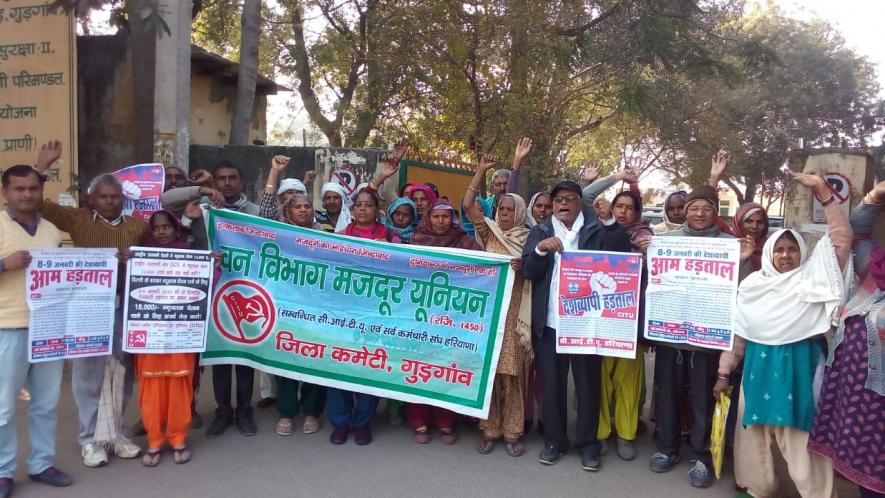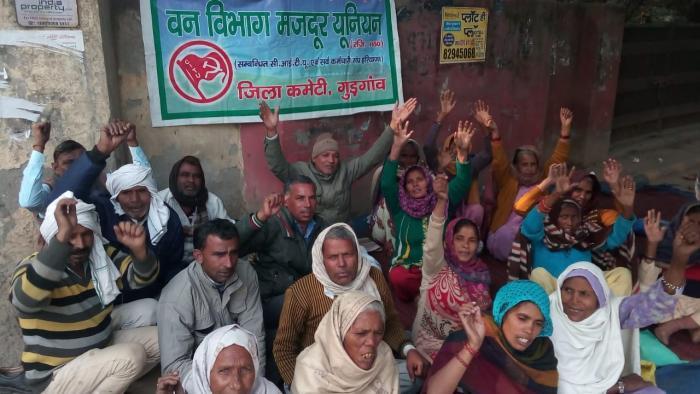Haryana: Forest Labourers Struggling For Regularisation Since a Decade in Forest Minister’s Hometown

It’s the 297th day of the indefinite strike staged by the forest workers outside the office of Gurugram’s Forest Department. Around 100 workers, under the banner of Van Vibhag Mazdoor Union, have been demanding regularisation of their jobs – a legislative right which was rendered by the Haryana state government way back in 2003.
“The strike observed by the workers is against the dictatorial attitude of the officials at the district forest department who have gone deaf and have turned a blind eye to numerous evidences of corruption and systematic exploitation,” said Satbir Singh, general secretary of Haryana state Centre of Indian Trade Unions (CITU) which have extended its support to the strike.
The Government of Haryana had, from time to time introduced policies in order to regularise the jobs of employees belonging to various state government departments including the workers of forest department who were working on contract basis previously. Out of these, the notable attempts were in 1988, 1993, 1996 and 2003.
Also read: Thousands of Construction Workers Protest in Jind, Haryana
According to Singh, the union was formed in 1987 and raised the demand of ending the contractualisation of jobs of well over 6,000 workers who were employed by the Haryana forest department. When the policies were enacted in subsequent years, around 4,000 of them were regularised, owing to the presence of records. However, even more than a decade after the last regularisation policy of the state government in 2003, not even a single labourer employed in the last 25 to 30 years in the forest department has been regularised in the Gurugram district – the only district in the state to have such a record. The labourers have been struggling since then just to secure permanent status.
The policy directs to confer permanent status on a workman who has completed 240 days of service in a single year for a period of three years and therefore, imposes certain obligations which need to be discharged by the employer.
However, in the case of Gurugram’s forest workers, the records have either been ‘burned’ or ‘destroyed’ without a creation of any online supplement, as the department officials have informed the protesting workers.

In a memorandum sent to Haryana’s Forest Minister Rao Narbir Singh earlier this year, the union has alleged that the functioning of the district forest department is “questionable” and that the injustice caused to the labourers is the result of the “deliberate” actions of the forest department officials. Interestingly, the minister even though belongs to the same district, however, has remained indifferent to the woes and cries of the forest labourers.
NewsClick also spoke to Vijay Kumar, district president of Van Vibhag Mazdoor Union, who said, “The required attendance and financial records of the labourers are concealed to deprive us of our legislative right of achieving a permanent status.”
“All these years, we have only been appeased with hollow assurances which do not translate to any material benefits,” said Kumar, “however, this time, we will continue to fight till the government respect our rights and regularises our jobs.”
The demand for regularisation is not a mere fight for securing tags. It is the difference in the salary and other social benefits that a contract worker does not get to enjoy for the same work as that of a permanent employee.
Also read: Continued Strikes by Haryana Workers : A Reflection of Failed Governance?
According to Kumar, a contract worker, with 26 days of attendance in a month, receives a salary of mere ₹ 5000 – ₹ 6000 as against to the salary of a permanent worker who receives around ₹ 24,000 which is according to the Grade – D pay scale of government employees.
“Now for the past ten months, we have left our children and work, and are sitting in front of the forest department office, all in the hope that our demands will be fulfilled,” Kumar added.
The forest workers, in addition to the agony, have also paid for their struggle in blood. Two women protestors died untimely due to worsening of their health.
“They both were subjected to extreme heat waves while being on the protest,” said one of the protesting workers, “and now there’s no one to look after their children.” The union is also demanding for immediate financial assistance for the families of the departed workers.
Get the latest reports & analysis with people's perspective on Protests, movements & deep analytical videos, discussions of the current affairs in your Telegram app. Subscribe to NewsClick's Telegram channel & get Real-Time updates on stories, as they get published on our website.
























